Secrets to Shopping in Japan: Guide to Annual Sales in Japan & Where to Shop
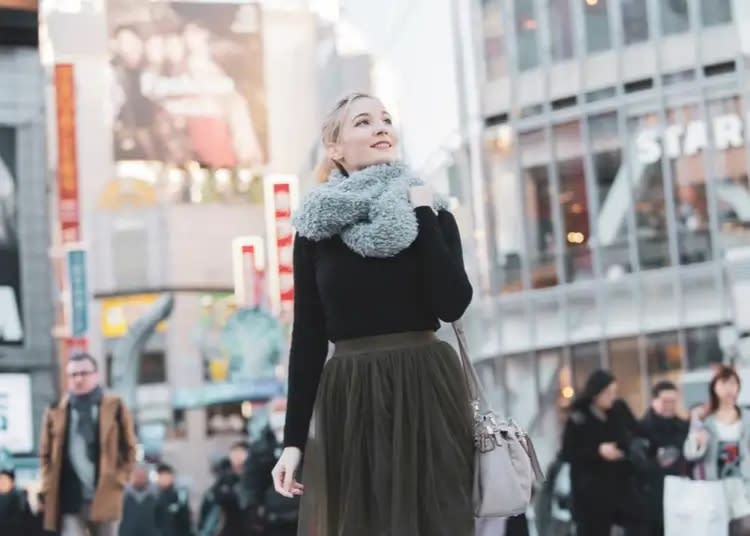
People who want to visit and enjoy shopping in Japan often hear this one particular sentence from friends and acquaintances: “But Japan is really expensive!”
There's some truth to this, as particularly touristy areas in Japan – with Tokyo being the most famous example – can have somewhat inflated prices. That doesn’t mean that there’s no shopping bargain to be made if you know when to strike!
So, when is the best time to go shopping in Japan? Let’s look at all the secrets behind a successful Japanese shopping tour!
About sales in Japan

(Image: PIXTA)
Since Japan has four seasons, "sales (セール)" or "bargains (バーゲン)" are often held at the change of seasons.
The biggest sales in Japan are the winter and summer sales. Clothing colors and materials change according to the season, and to clear their inventory, shops will release products at discounts ahead of the next season.
The apparel industry also divides the year into two major periods, spring/summer and fall/winter, when new releases are made.
Also, since many Japanese companies pay bonuses in summer and winter, shops will aim to encourage people to do a lot of shopping while their pocketbooks are still warm.

(Image: PIXTA)
Summer sales focus on summer clothes, accessories, and appliances to cool off, plus items in flashy summer colors.
In winter, heavier clothes, winter-designed accessories, cold-weather appliances and goods go on sale. Clothing that was in fashion that season also tends to be highly discounted, as shops want to make room for the next year.
While Japan's big bargains are in summer and winter, many stores also ride international trends, so you can expect to see a variety of sales throughout the year.
Main annual schedule for sales in Japan
- April to Mid-May
- Late June to Mid-August
- November to Mid-December
- Late December to January
Japanese Clothing Fan? 7 Best Tips for Clothes Shopping in Japan!
Breakdown of seasonal sales in Japan
January: First sales of the year - and don’t miss out on the “Fukubukuro!”
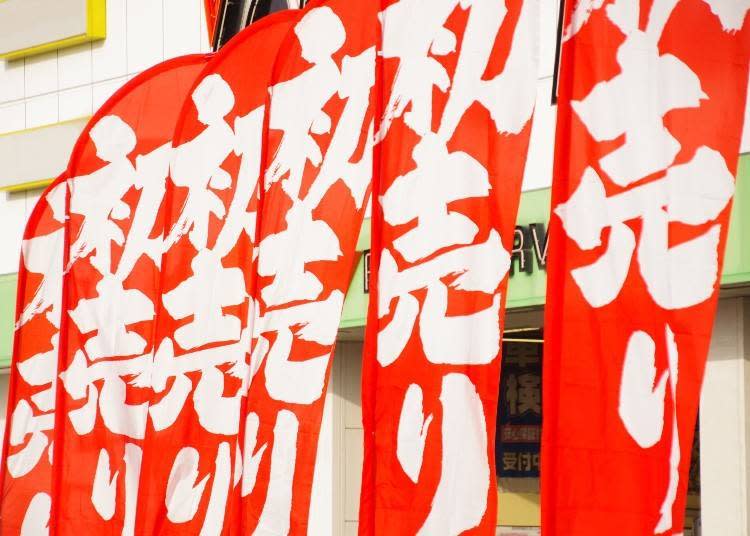
(Image: PIXTA)
Winter sales peak from early to late January! Many department stores, fashion buildings, and clothing stores conducted their first sale of the year (called Hatsu-uri / 初売り) around January 2 and continued their winter sale until late January. Also, note that many shops are closed on January 1.
・What kinds of products are on sale?
The main feature of the year's first sales is the Fukubukuro (福袋). The Fukubukuro (lucky bag) contains items that are several times the selling price of the bag. The bag's contents are a mystery, but they include various items such as apparel, cosmetics, food, stationery, jewelry, and home appliances. There is a risk that items may not be to your liking, or the size might not fit. However, the excitement and discount are worth it.
・Where can I find these sales?
Department stores, shopping malls, outlets, and other large commercial facilities where New Year's sales are held and fukubukuro are sold, as well as brand stores.
Tokyo Sales Secrets: Best Shops for Bargains & 'Fukubukuro' Lucky Bags
Febraury: Winter clearances and chocolate sales

(Image: PIXTA)
February and March will calm down after the onslaught of winter sales - but that doesn’t mean there aren’t any sales!
・What kinds of products are on sale?
Winter items are often available at rock-bottom prices as stores clear out their inventory. While you can find unbeatable prices for trendy items, the most popular names will sell out quickly.
Also, February and March are perfect for chocolate and sweets after Valentine’s Day and White Day. In Japan, on Valentine’s Day (February 14), women give men chocolate gifts, and on White Day (March 14), men return gifts to women.
After the chocolate festive by chocolate manufacturers is over, rare overseas brand chocolate and new chocolate by famous patissiers go on sale while they are within the shelf life. For chocolate lovers, February’s Valentine’s season with a huge chocolate brand lineup is worth a look even before the sale kicks off.
・Where can I find these sales?
Apparel stores, electronics retailers, etc.
March & April: Sales on lifestyle goods

(Image: PIXTA)
In Japan, March is the graduation season, and April is the beginning of the school year. Many companies also start their new fiscal year, and this is the time when people enter a new company, transfer to a new company, or otherwise change their environment and lifestyle. This is when the "New Lifestyle Sales (新生活応援セール)" are held.
・What kinds of products are on sale?
Many people move or start living alone at this time of year, so household goods, interior goods, and furniture and appliances become cheaper.
・Where can I find these sales?
Consumer electronics stores, household goods stores, etc.
May: Golden Week sales
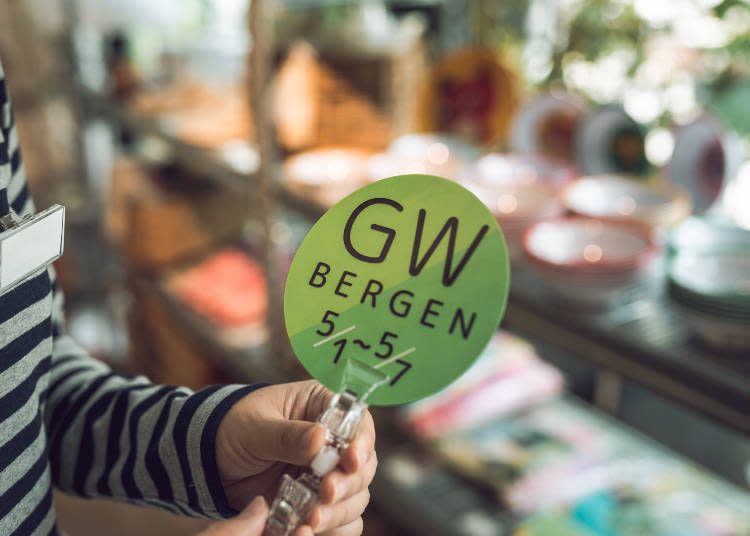
(Image: PIXTA)
Items start being displayed in early February, and the lineup is full by mid-March. By April, stores will begin changing their lineup to summer goods by the end of Golden Week (GW). Golden Week is thus a time when you can expect to find some great sales.
・What kinds of products are on sale?
For apparel, expect to see sales on spring and summer items. For video games, many companies also offer price reductions at this time of year. In malls, shops in major station buildings, and other shopping centers, Golden Week campaigns are held, with deals such as "buy X items and get 20% off" or "spend X yen and enter a raffle or get a present."
・Where can I find these sales?
Consumer electronics stores, shopping malls, etc.
Late June to Mid-August: Summer sales in Japan
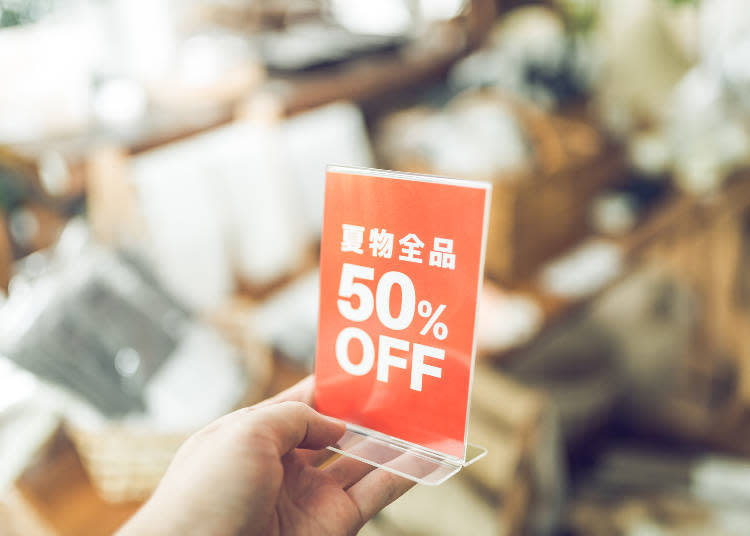
(Image: PIXTA)
The peak for summer sales in Japan is from late June to mid-July. Sales periods differ depending on the shop style; however, most department stores and fashion shops conduct their sales during this time. Outlet malls will start their sales in late July to early August. Sales are typically held around August 15, and they aim to attract as many customers as possible during the Obon holiday season in Japan.
Since the sales end date varies, check each store’s information beforehand. If the sale period is long, the closer it gets to the end date, the discount rates increase. However, there is a higher chance that popular items will become sold out, so determining the correct timing becomes important.
Also, generally, the summer bonus is given out around mid-June in Japan, so expensive home appliances go on sale in July.
・What kinds of products are on sale?
Seasonal products unique to summer, such as summer clothes, leisure items for the beach and pool, and home appliances to cool off, are especially affordable.
・Where can I find these sales?
Department stores, department stores, shopping malls, electronics retailers, etc.
October: Autumn sales, Halloween sales

(Image: PIXTA)
Sales are held in the fall and around Halloween.
・What kinds of products are on sale?
Summer clothes are sold out and some new winter items may be discounted at this time. Note that autumn sales are not incredibly trendy and discount rates can be low as a result. Halloween-related foods and goods are sometimes discounted in clearance sales after October 31.
・Where can I find these sales?
Department stores, department stores, shopping malls, etc.
November: Black Friday and several other sales

(Image: PIXTA)
In recent years, many new sales have occurred weekly from November to early December.
Professional Baseball Japan Series Championship Sale
In Japan, where baseball is a major sport along with soccer, a unique sale is held: the Professional Baseball Japan Series Championship Sale. This sale is conducted by the winning team’s sponsor and is not guaranteed to be held every year; however, it has become a seasonal event that is a bonus for the winning team’s fans.
Depending on the winning team’s sponsor’s business, the region where the sale is held and products will vary.
・Sale Period: 3 days after the winning team is decided (early November)
・Where: Where the winning team’s sponsor products are sold
Professional Baseball Japan Series Championship Sale: Sponsors Sale
- Team Name/Owner
- Hiroshima Toyo Carp (Mazda)
- Hanshin Tigers (Hanshin Electric Railway)
- Yokohama DeNA Baystars (DeNA)
- Yomiuri Giants (Yomiuri Newspaper Group)
- Chunichi Dragons (Chunichi Shimbun)
- Tokyo Yakult Swallows (Yakult)
- Fukuoka SoftBank Hawks (SoftBank)
- Saitama Seibu Lions (Seibu Railway)
- Tohoku Rakuten Golden Eagles (Rakuten)
- ORIX Buffaloes (ORIX)
- Hokkaido Nippon-Ham Fighters (Nippon Ham)
- Chiba Lotte Marines (Lotte Holdings)
Ii Kaimono no Hi (A Good Day to Shop)
Ii Kaimono no Hi is held on November 11. It is a large-scale sale held at stores and online shops by five main companies. The companies are search engine and shopping site operator Yahoo!, Japan’s major telecommunications company SoftBank, music and book rental shop TSUTAYA, major convenience store Family Mart, and T Point Japan, which operates a point service when purchasing from the companies above.
The sale was originally started in 2009 by Taobao (Tmall) in China and was called “W11 (double eleven)” since it was held on November 11. In 2018 the gross sales in China were 314.3 billion yuan, and the market is continuing to grow and expand. Aiming to get a piece of the market, e-commerce has crossed borders and spread worldwide. In Japan, they started running sales in 2015.
・Sale Period: One week before and after November 11
・Where: Online shops, convenience stores, and others
Black Friday Sales in Japan
Black Friday is a major sale conducted once a year after Thanksgiving Day in the United States. It is a major event where many shops such as department stores, supermarkets, home appliance stores, and others offer huge discounts before Christmas. It has a festive feel like Japan’s New Year’s sale.
In Japan, major shopping mall company Aeon Mall conducted Black Friday in 2016. Now Ito-Yokado, APiTA, and other shopping mall chains, along with online shops such as major EC site Rakuten, have started holding Black Friday. This is quickly becoming a standard massive sale right before the holiday season.
Only at shopping mall sales are there major discounts that put home appliances below 50% and a great discount for personal goods.
・Sale Period: 4th Friday of November
・Where: Shopping malls, supermarkets, online shops, and others
Black Friday in Japan: These Are the Travel Deals to Check Out!
Cyber Monday in Japan
Cyber Monday is a sale conducted on online shops after Black Friday. Cyber Monday offers more discounts on goods that were left over from Black Friday and offered a chance for people who missed Black Friday to get what they were looking for.
Cyber Monday is still not a standard sale in Japan, however, Amazon.co.jp conducts a large-scale campaign, and over 2,000 items go on sale. Looking at the past few years, Amazon.co.jp Cyber Monday is held from the end of November to early December. Compared with being held immediately after Black Friday, there is a tendency to start late two weeks later.
For people visiting Japan during this period, it is possible to have Amazon deliver the goods to your hotel. It depends on the inventory, but items purchased on Amazon will be delivered within 3 days. For a detailed delivery date, check the website.
・Sale Period: December 7-11 (generally, from the fourth Thursday in November to the next Monday)
・Where: Amazon and other online shops
December: Winter sales, Christmas sales, Year-end sale

(Image: PIXTA)
In December, there are many events, such as Christmas parties, end-of-the-year parties with friends or co-workers, and New Year’s Eve.
・What kinds of products are on sale?
In Japan, the winter bonus is issued during this period, and department stores and shops are filled with customers looking for gifts for themselves, coworkers, friends, and family. Also, home appliance stores have big sales on major household appliances and electronics.
December is also one of the best times to buy clothes and appliances - brands will usually be releasing a new series that they focus on for the new year, so getting rid of older items is almost like tidying up.
During this period, you will see many advertisements for Christmas sales and year-end sales, however, the really big discounts start after the New Year for winter items.
・Where can I find these sales?
Department stores, department stores, electronics retailers, etc.
Other sales in Japan

(Image: PIXTA)
In addition to seasonal and calendar-based sales, different stores offer different types of sales.
・Open Sales
Sometimes these sales are held when a store or facility newly opens or reopens after being refurbished. In many cases, the sale lasts from the first day to several days.
・Closing Sales
These sales are often held when a store or facility closes to dispose of inventory. The period varies, but sometimes they are held for a relatively long period of time, such as one month before closing.
Things you should know about Japan sales

(Image: PIXTA)
There are a few things to keep in mind when purchasing and dealing with sale items during a sale period. Basically, since some items are low in stock or limited to the actual item, it is important to assume that exchanges or returns are not possible.
・Sale items often cannot be returned or exchanged except if they are defective.
・Sale items may be in low stock and may be difficult to exchange.
・Sale items may not be available for try-on.
・Gift wrapping may not be available.
Handy Japanese words to remember for shopping

(Image: PIXTA)
Here are some of the most commonly used Japanese sale terms. You will often see them on store pop-ups and signs, so it is useful to know them.
Japanese 101: Helpful Phrases to Know Before Going Shopping for Clothes
Main facilities with sales

(Image: PIXTA)
- ・Department stores
- ・Electronic appliance store
- ・Shopping mall
- ・Stationary stores
- ・Fashion shops
- ・Japanese brands
Stores in Japan where you can buy at a good price

(Image: PIXTA)
Even if there isn't a sale going on, you can find excellent deals on products at these shops.
- ・Outlets
- ・Used goods store, recycle shop
- ・100 Yen Shops
Shibuya Cat Street: Top 5 Second Hand Shops in Harajuku
Inside Komehyo Shinjuku: Everything You Need to Know About Japan's Second-Hand Shop
Discounts are also available with LIVE JAPAN!
BicCamera
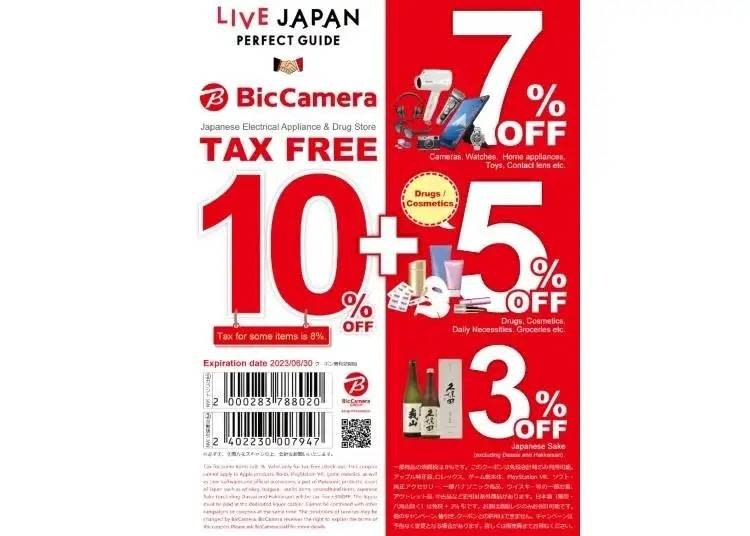
In addition to duty-free items, cameras/watches, home appliances, toys, contact lenses, etc. are 7% off, pharmaceuticals, cosmetics, food, daily necessities, etc. are 5% off, and sake (excluding Dassai and Hakkaisan) is 3% off. It's a great deal! Please use it when checking out.
Browse shops offering coupons and other deals
Take advantage of Japan's sale seasons and shop well!

(Image: PIXTA)
In Japan, sales are held according to the season. With this guide, you can find the right time to find bargains. Just note that sale items are often in limited supply, so if you find something you want, don't hesitate to buy it right away!
*The information in this article is current as of December 2022. Please check the official website for the latest information.
Written by:

Miyuki Yajima
After working in planning, editing, and business development/sales at a continuing education business, she is currently working as a writer, yoga instructor, and traveler in pursuit of a multi-career lifestyle that combines hobbies and work. She also likes fashion, Japanese culture, and music.
Tax-Free Shopping in Japan: How to Shop and Get Your Japan Tax Refund
10 Best Tokyo Shopping Districts: Where to Shop and What to Buy There
Shop Til you Drop! 5 Awesome Outlet Malls Near Tokyo
8 Best Osaka Shopping Districts: Where to Shop and What to Buy There
Complete Shopping Guide to the Best Sendai Shopping Malls
Shopping in Sapporo: Ultimate Guide To Sapporo's Best Shops & Shopping Areas


